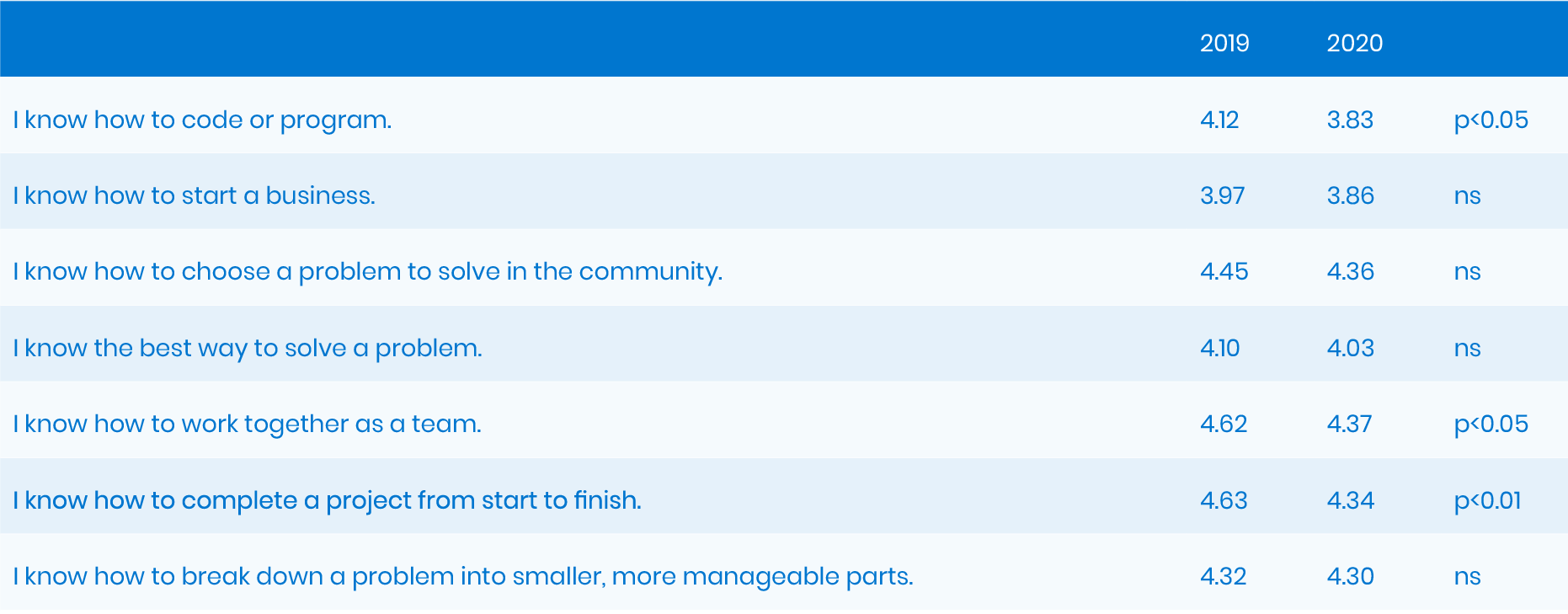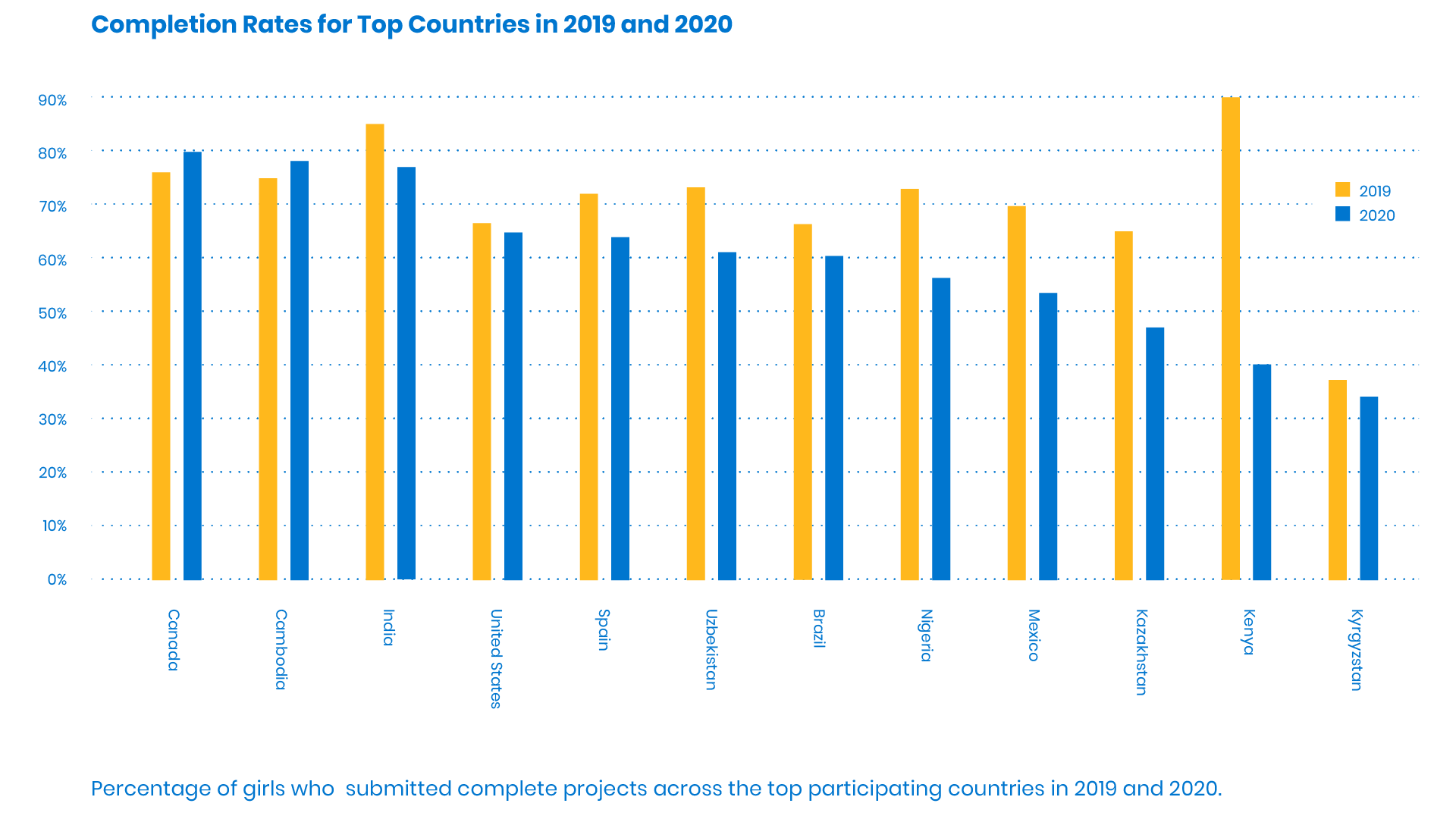To say 2020 was a difficult year is beyond an understatement. We’re still grappling with the COVID-19 pandemic as well as its effects on our communities. We’re just beginning to understand the impact of the pandemic on education, particularly girls’ education, and how many girls will have slipped out of schools over the last year and a half. With that in mind, as we pulled together our 2020 impact report we knew we wanted to not only reflect on Technovation Girls’ program impact, but where we go from here, as a global community. The report includes analysis of 2020 program impact as well as multi-year comparisons, community strategies for resilience, and recommendations for education organizations as well as our supporters.
The full report is available for download, but below are a few of our key takeaways. We hope that other education organizations can learn from our experience and accelerate efforts to support girls to thrive in a post-COVID-19 world.
2020 Completion Rates: Lower than previous years
Fewer girls completed the program than in previous years. Those who did complete the program did so with incredible support from Chapter Ambassadors, Mentors, Student Ambassadors.
20,388 girls from 62 countries designed a total of 1,520 tech-based apps addressing problems in their communities in 2020. They were supported by 10,491 Mentors and Chapter Ambassadors—support essential to girls’ success in completing the program.
Year over year, we saw a drop in program completion rate (measured by the number of girls who submitted projects). Overall, program completion rate dropped by 12% compared to 2019. We attribute this to the COVID-19 pandemic and resulting lockdowns, which limited many girls’ access to computers, laptops, internet, data or mentors.
We spoke to several Chapter Ambassadors to understand what the season looked like on the ground for them, and what strategies they used to keep girls engaged. Most chapters navigated a lack of computers by using cellphones, messaging tools, and lending USB keys and laptops. Some Chapter Ambassadors contacted local government officials for support or access to resources, and others benefited from local volunteers working remotely. We also saw two trends among the stories we heard:
- If teams met in-person before COVID-19 lockdowns started, they were more likely to continue and finish the entire program
- Having strong local corporate partners really made a difference, as they could provide crucial resources like devices, access to the internet, and mentors
This tells us once again what we already know: deep, strong networks of support are essential to resilience for girls and their communities. Collectively we must fund communities and networks of support, as these efforts can not be sustained as volunteer efforts forever.
2020 Learning Gains: Lower than in previous years
Technovation Girls did report learning gains—but less so than in previous years, due to the pandemic, school closures, and lockdowns.
While students made learning gains in 2020, these gains were significantly lower in 2020 compared to 2019. These year over year decreases were particularly evident in areas such as learning how to code, working in teams, and persisting through the full 3-month program. Such drops year over year are most likely due to the fact that teams were not able to work together in person or receive additional in-person technical help and mentoring.
To better understand the full impact of COVID-19 on student learning gains, we also compared the 2019 and 2020 post-survey results with impact results from the previous four years. In context of our five-year impact, it is clear that while there was a decrease in learning gains between 2019 and 2020, the learning gains students reported in 2020 were comparable to learning gains they reported in earlier years of the program. This resilience in 2020 is primarily due to the strong local infrastructure and support that the Technovation Chapter Ambassadors and mentors were able to mobilize to support the girls.
Download Technovation’s full 2020 Impact Report for more detail on this multi-year comparison.
Devices alone aren’t enough. We need mentors to support girls’ learning.
Strong local infrastructure and quick mobilization on the part of Mentors and Ambassadors helped girls successfully stay engaged and complete their projects.
Mentors have always been a critical part of the Technovation program, and they played an even more pivotal role during 2020.
- In 2020, over 90% of the teams who completed the program had a mentor.
- Almost 70% of students reported receiving a great deal of mentor support in 2020.
Mentors and Chapter Ambassadors support and encourage girls, provide feedback on their ideas, and help them troubleshoot technical issues as they build their apps. They also provide girls with another critical resource: access to multiple forms of social capital. Adequate access to the internet is essential, but as governments and the private sector move to provide internet to communities around the world, we need to make sure we are not forgetting the equally critical piece of building social capital and mentorship for girls.
Girls are already changing the world. Let’s make sure they have the skills to keep going.
Girls develop skills in computational thinking as well as communication, entrepreneurship, and data analysis.
Although Technovation Girls’ participants reported a lower depth of learning gains in 2020, the program still had a significant impact on their skills. Post-survey results illustrate the depth and breadth of real-world, problem solving and teamwork skills that the Technovation experience provides, which is far beyond just learning how to code.
- 93% of students indicated increased teamwork and collaboration skills.
- 84% of girls indicated behaviors demonstrating increased persistence after Technovation.
- 81% of girls indicated increased data science skills, including data analysis, making data-informed decisions, and visualizing data
- 80% of girls reported improvements in their project management skills
- 69% of girls reported improvements in coding ability
Girls around the world care about the same issues as adults and world leaders. As we invite them to tackle those problems using technology, we also want to ensure we help them develop critical thinking and complex analysis skills. Technovation’s goals aren’t only to help girls learn how they can create with code, but to effectively use that code to change their communities and solve enormously complex issues.
In addition to teaching content, we also have to help build their motivation, capabilities, and agency , as well as their understanding of complex systems.
Long-term Impact: Technovation influences girls long after the program ends
In 2020, an external evaluation firm, WestEd, conducted a long-term impact study to interview and survey the first cohort of Technovation Girls alumnae who participated 9 years ago. They explored two main questions:
- What impact did Technovation have on alumnae career and higher-ed choices/decisions?
- Is there any connection between alumnae post-survey responses (shared right after participation), and their current decisions/choices?
Results of this analysis were very heartening. 76% of Technovation alumni are pursuing a STEM degree and 60% of alumni are working in STEM-related positions.
“This project started out as a problem that didn’t directly impact me. But as I listened and did interviews, read articles and saw the extent of this problem, I ended up volunteering, trying to start a club and am currently debating if I should register [my business] as an official charity after Technovation Girls. Technovation helped me develop a passion for the environment, build confidence, and most of all, make new friends who have the same passion for learning and trying new things I do.”
—Diya M., Canada



